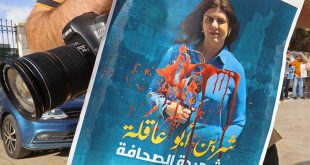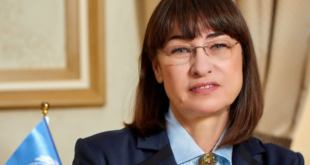Diana Buttu*
(Guest Essay)
Secretary of State Antony Blinken is visiting Israel and plans to visit the West Bank in an attempt to bolster Friday’s cease-fire, which halted Israel’s bombing campaign in Gaza and Hamas’s rocket attacks on Israel. On Tuesday, Mr. Blinken spoke in Jerusalem about his intention to “rally international support” to aid Gaza and rebuild what was destroyed.
Despite the cease-fire, protests by Palestinians in Jerusalem and elsewhere have continued, the Israeli police have arrested scores of Palestinians in the West Bank and East Jerusalem and Israeli settlers have persisted in their provocations.
The fault lines in Israeli society have never been clearer and Jerusalem remains the tinder box that could ignite another catastrophic fire unless the underlying causes — Israel’s occupation of the Palestinian territories and its highly discriminatory policies — are dealt with.
Two weeks ago, I was in my family’s home in Haifa, a city in northern Israel where both Palestinians and Israelis live. I saw groups of young men carrying Israeli flags and tire irons march by, shouting, “The people of Israel live” and “Death to Arabs!”
My father and I watched on live television as a crowd of Jewish men in another mixed town, Lod, asked a man if he was an Arab, then pulled him out of his car and beat him. Some Palestinian citizens of Israel vented their frustration and anger against Jewish Israelis and symbols of the Jewish state that oppresses them by burning down a synagogue in Lod.
Haifa, whose population is 85 percent Jewish and 15 percent Palestinian, has long been presented along with Lod and other mixed cities in Israel as a model of coexistence. Which is why, in the past few weeks, the question has repeatedly been asked: How could these cities suddenly be transformed into sites of mob violence?
The truth is that the Palestinian citizens of Israel and the Jewish majority of the country have never coexisted. We Palestinians living in Israel “sub-exist,” living under a system of discrimination and racism with laws that enshrine our second-class status and with policies that ensure we are never equals.
This is not by accident but by design. The violence against Palestinians in Israel, with the backing of the Israeli state, that we witnessed in the past few weeks was only to be expected.
Palestinian citizens make up about 20 percent of Israel’s population. We are those who survived the “nakba,” the ethnic cleansing of Palestine in 1948, when more than 75 percent of the Palestinian population was expelled from their homes to make way for Jewish immigrants during the founding of Israel.

My father was among the 25 percent of the Palestinian population that remained. He was 9 years old when he was forced out of his home in Mujaydil, a Palestinian village near Nazareth. My father and his family moved to Nazareth. Because they fled to Nazareth, a mere 1.8 miles away, Israeli laws declared him and his family as “present absentees,” which meant that Israel could take away their property.
And so, it did: Israel destroyed his house, his school and his entire community to make way for Jewish immigrants. In place of Mujaydil, Israel created a Jewish-only town called Migdal Haemek. He was rendered an unwanted non-Jew in the “Jewish state” of Israel, rather than an equal citizen in his homeland.
From 1948 until 1966, he and other Palestinians in Israel lived under military rule — much like that which exists in the West Bank today — having most of their land taken from them and required to get permits to travel from one place to the next. My father had to wait years before he could make the short journey to see what had become of his home and school.
In Israel, the nakba is routinely denied or dismissed, and state funding to organizations that commemorate it is prohibited. At school, history books teach us about Jewish attachment to our land, but remain silent on the nakba. It is as though we are interlopers in our homeland.
When military rule ended in 1966, Israel propagated the myth that Palestinian citizens of Israel were now full citizens, noting that we can vote for members of the Knesset and that we have representatives there too. But since its establishment, Israel has enacted more than 60 laws entrenching our second-class status. One law makes it possible for Jewish Israelis in many towns to deny me and other Palestinians the right to live alongside them because we are not “socially suitable.”
Courts routinely uphold such discriminatory laws and lawmakers have year after year blocked attempts to pass legislation enshrining the equality of Palestinians and Jews. The institutionalized racism and discrimination against Palestinian citizens have pushed almost half of us into poverty and our unemployment rate has soared to 25 percent.
Racism against Palestinians is incited and exploited by virtually all major Israeli politicians and parties. (The Labor Party, which has a mere seven seats in the Knesset, is the only exception.) Even “moderates” like the Yesh Atid leader Yair Lapid, who has been tasked with forming a government in the wake of inconclusive parliamentary elections in March, declared that he wants to be “rid of Arabs” and that his most important priority is “to maintain a Jewish majority in the land of Israel.”
Politicians call for our citizenship to be revoked, or worse — like the former foreign ministerAvigdor Lieberman, who said our heads should be chopped off, or the former education minister Naftali Bennett, who declared that he had killed many Palestinians and had no problem with it.
Since 2019, Prime Minister Benjamin Netanyahu has twice made electoral pacts with the overtly racist Jewish Power party, which is made up of followers of the notorious Meir Kahane, whose Kach party and offshoots were labeled terrorist organizations by the United States. Jewish Power is led by Itamar Ben Gvir, who says his hero is Baruch Goldstein, who gunned down 29 Palestinians as they prayed in Hebron in 1994.
All of this does not merely garner votes for Mr. Netanyahu, it also normalizes hatred of Palestinians. Young Jews are more radicalized than their parents, with polls showing that they do not want to live next to Palestinians and support revoking our citizenship.
This prejudice, racism and violence directed at Palestinians are not limited to the fringe in society — it has become mainstream. In May alone, Mr. Netanyahu’s government allowed marches by violent Jewish supremacists through Palestinian neighborhoods of Jerusalem and into the Aqsa mosque compound. Israeli police officers and Jewish citizens have been offered de facto immunity for attacking Palestinians.
Indeed, our mere existence nettles Israel’s ruling elites, who insist on preserving the Jewishness of the state. My father, who is 82, still waits for the day when he does not have to live in fear that we will be evicted from our homeland. To be a Palestinian in Israel is to wait for the day when Israel will decide to forever rid itself of you.
How do I explain to my 7-year-old son what being a Palestinian citizen of Israel means? What future can he look toward, when the leaders of the government incite hatred against him? What audacious hope can he have when he is bound to face racism and discrimination in education, employment and housing?
For now, I try to shield him from the images on television and on our phones, but there will soon come a time when I cannot shield him from the reality that he is surrounded by people who consider him a second-class citizen.
*Diana Buttu is a lawyer and former adviser to the negotiating team of the Palestine Liberation Organization. She is Palestinian citizen of Israel born in Canada and educated in Canada and The United States.
First published by The New York Times.
The Times is committed to publishing a diversity of letters to the editor. We’d like to hear what you think about this or any of our articles. And here’s our email: letters@nytimes.com.






